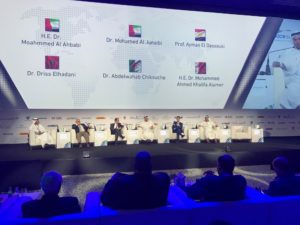
Leaders and senior officials from a number of Arab space agencies have committed themselves to further regional space cooperation, and provided updates on their national space programmes, at the Global Aerospace Summit 2018 held at the St. Regis Hotel on Abu Dhabi’s Saadiyat Island on 30 April and 1 May 2018.
Leaders and officials from eight Arab space agencies were hosted by the UAE Space Agency in a private meeting on the sidelines of the Global Aerospace Summit on 30 April 2018, where for the second year running they discussed regional space cooperation in capacity building, space science, and remote sensing for resource management and environmental monitoring.
In a public session held the following day and moderated by H.E. Dr. Mohammed Al Abahbi, the Director-General of the UAE Space Agency, leaders and senior officials from Algeria, Bahrain, Egypt, Morocco, and the UAE provided updates on their respective national space programmes.
Speaking on behalf of the Algerian Space Agency (ASAL), Dr. Abdelwahab Chikouche said that Algeria’s space programme has evolved rapidly over the past decade with the operation of three Earth observation satellites used for resource management, environmental monitoring, and security in and around Algeria, as well as the launch in late 2017 of its Chinese-built communications satellite. Dr. Chikouche also said that ASAL is placing emphasis on developing basic space research activities in Algeria as well as ensuring a constant stream of satellite engineers and scientists from Algerian universities into the space sector.
From the Bahraini National Space Science Agency (NSSA), H.E. Dr. Mohammed Al-Amer told the audience that while still in its infancy since its founding in 2015, the NSSA is well-placed to attend to Bahrain’s space needs and interests having just completed a strategic review of its priorities and programme. Dr. Al-Amer mentioned that Bahrain has been a consumer of space data, such as satellite imagery, since the late 1980’s and had identified a requirement for a national high-resolution Earth observation satellite. This requirement, however, is on hold due to the drop in oil prices and the recent NSSA strategic review is seeking other ways to meet Bahrain’s Earth observation requirement.
Professor Ayman El Dessouki from Egypt’s National Authority for Remote Sensing and Space Sciences (NARSS) informed the audience that Egypt’s new space law was passed by the Egyptian parliament in January 2018, and that a national space agency is currently being created under the auspices of the office of the Egyptian president. Professor El Dessouki also mentioned that Egypt is still negotiating a deal for the EGYPTSAT-A Earth observation satellite (the replacement for EGYPTSAT-2 that failed in orbit in 2015) but is hopeful that it will be launched in by 2020. He also spoke of the emphasis being placed in Egypt on developing space infrastructure, such as a satellite testing and integration facility (where it is hoped that EGYPTSAT-A will be integrated), and a capacity building initiative with Egyptian universities that will see students build Cubesats.
Speaking on behalf of Morocco’s Royal Centre for Remote Sensing, Dr. Driss El Hadani (Director), provided an overview of Moroccan space activities, especially in remote sensing. Dr. El Hadani spoke about Moroccan efforts to develop human capacity and technology since the 1980’s in satellite applications, and described how Rabat has systematically integrated remote sensing techniques and applications across all sectors in Morocco for everything from resource management and environmental monitoring through to national security and public safety. These efforts are culminating with the launch late last year of the Mohammed VI-A high-resolution Earth observation satellite (based on the French Pleiades Earth observation satellite), and the launch by the end of 2018 of its twin satellite, the Mohammed VI-B, both built by Airbus Defence and Space and Thales Alenia Space.
Finally, Dr. Mohammed Al Junaibi of the UAE Space Agency updated the audience on the range of UAE space activities and programmes, emphasising the progress being made on the Emirates Mission to Mars in 2021, the Mars 2117 initiative, and the expectation that by the end of 2018 the four-person Emirati astronaut corps will have been selected. Dr. Al Junaibi noted that 2018 is an important year for the UAE space programme, and the UAE overall, since it is the Year of Zayed, marking the centennial of the birth of the founder of the UAE, His Highness Sheikh Zayed bin Sultan Al Nahyan, father of the current President and Vice-President of the UAE.
 SpaceWatch.Global An independent perspective on space
SpaceWatch.Global An independent perspective on space




